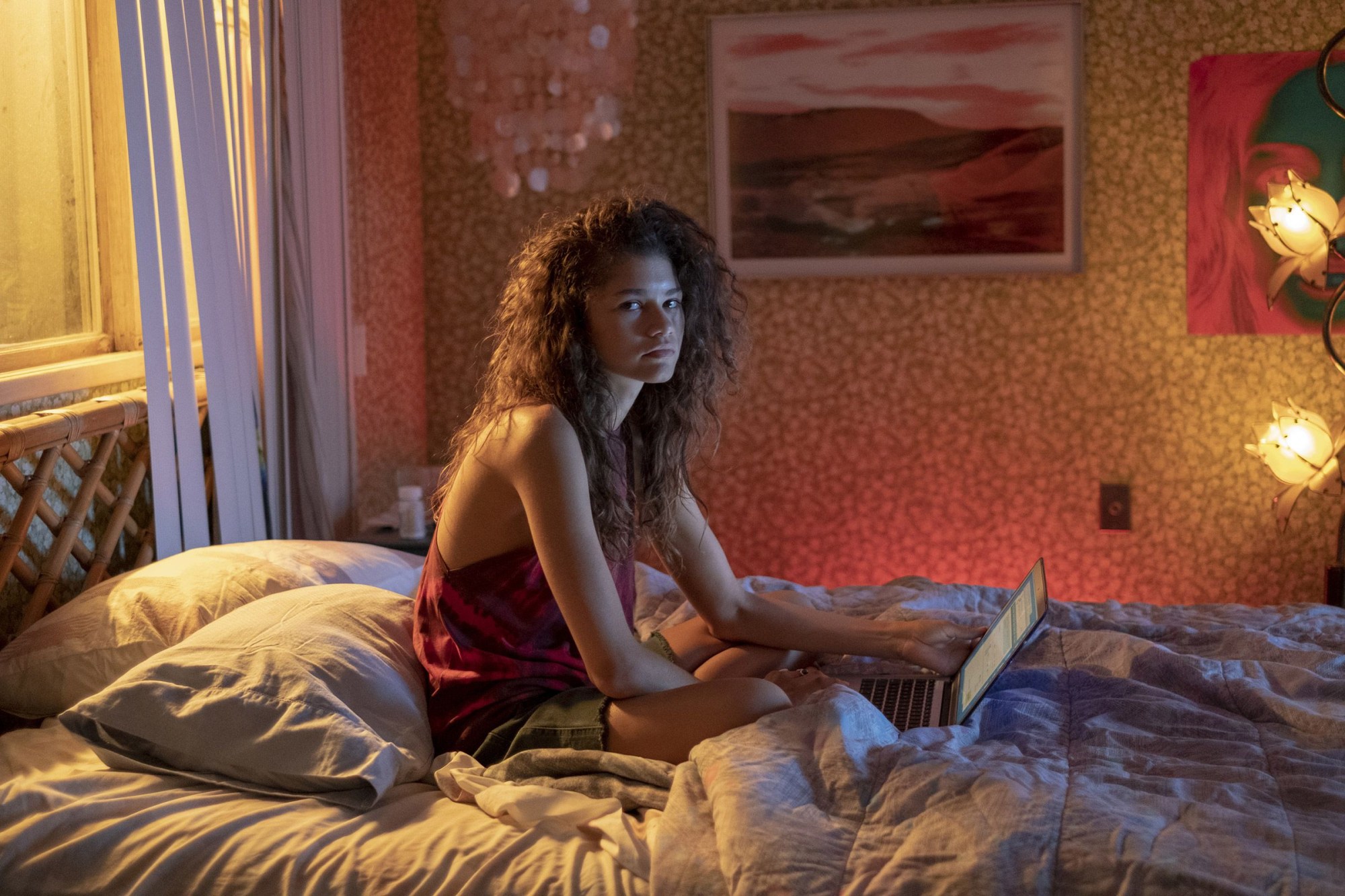A lot has been made of Euphoria’s scene with 30 dicks. The HBO drama, which stars Zendaya and has been exec produced by Drake, is doing for penises what Game of Thrones did for breasts, so obviously people are interested.
The scene in question takes place in a male locker room, a gender-twisted homage to Carrie, and actually touches on some significant issues – toxic masculinity, repressed sexual desires, the sexualisation of young men. But the main takeaway from it has been the penises (a fact not helped by showrunner Sam Levinson telling The Hollywood Reporter that HBO had scrubbed a further 50 dicks from that scene).
This reduction of Euphoria, which is based on an Isreali drama of the same name, is both the show’s biggest asset and its largest hurdle. Mixing the shocking realism of Larry Clark’s Kids, the narcotic aesthetic of Trainspotting and the dramatic pull of Skins, it is clearly designed to get fingers wagging.
Centred around Zendaya’s character, Rue, a 17-year-old drug addict fresh from rehab following an overdose with no intention of staying clean, the show paints a fairly bleak portrait of the current teenage experience. Sex is treated as currency, shared via illicit photos and videos of underage teen bodies. Negative and damaging behaviours have become ingrained through learning about sex from Pornhub. People are coerced into giving up their virginity. The confused sexual desires of teens gives way to blackmail and even statutory rape.
Then there’s the drugs, which certainly aren’t glorified but are pervasive (at this stage, no one bats an eyelid at underage drinking, right?). Social media platforms were not presented as particularly anxiety inducing, as one might have assumed. Rather, as a generation whose lives exist as much online as they do IRL, these kids are digital natives in the truest sense, relying on social media and the internet to help fill whatever void afflicts them.
All of the above is presented realistically, often artistically, and is sometimes – as with the case of the statutory rape and the underage nudes — integral to the show’s plot. But from the first four episodes that I’ve seen, much of the nudity, scenes of dicks (one of which was actually a prosthetic), sex scenes and drug taking are there to provoke parents, politicians, right wing commentators and conservatives, while generating headlines. Courting controversy is this show’s way of getting bums on seats.
“That children as young as 10 are digesting pornographic tropes, especially how women in pornography are treated, is presented as blasé – in a world where social education is constricted by shifts between liberalism and conservatism, the show asks us: how else are young people going to learn about sex?”
But by doing this, Euphoria undersells what is often an accurate, distressing and essential portrayal of adolescence, friendship and trauma. In the character of Rue, for example, we have someone not only muddled from years of (perhaps) misdiagnosis, but also experiencing the malaise and distress of existentialism; Rue isn’t a hedonist, but rather crippled by anxiety about, well, everything. Zendaya plays this role delicately and with pathos, and through her portrayal Rue morphs between brittle and boisterous as she explodes with the highs of the drugs she’s taking and relationships she’s building, dipping drastically when confusion and the crash become too much.
One particularly tender dynamic is the relationship between Rue and her 13-year-old sister, Gia. It was Gia who discovered Rue unconscious, covered in her own vomit following her overdose, and as the series progresses it’s clear that Rue’s guilt over this incident will battle with her natural protectiveness. The implications of the overdose spreads out, it’s impact rippling not only across her own family but into her relationships with outsiders, too. Rue’s dealer, Fezco, a teen forced into crime in order to support his terminally ill parent, is also caught in a cruel dichotomy between making money in any way possible and his own morality. There’s comedy here – Fezco’s younger brother, a literal child, is also a boss, who seems adept at everything from transferring cryptocurrency to doling out baggies, and this provides some light relief. But like everything in Euphoria, peer too closely and beneath the humour is a darker world barbed with thorns.

This battle between light and dark is best exemplified by the character of Jules, played expertly by model and activist Hunter Schafer. Jules, a young trans girl, is a newcomer to the suburb where Rue lives and the pair’s friendship is central to the show’s success. There’s so much tenderness between these two outcasts, and for much of the first four episodes you’re egging them on together, hoping that what they have can sit somewhere between a friendship and full blown relationship.
Jules, however, sparkles in the sun and almost disappears in the dark. She’s so alive, her make-up weird and experimental, and her smile bright. She’s wide-eyed, not in naivety, but with what seems like an appreciation for life. But her complexion – pale with light blonde hair – melts into dim lighting of the many scenes that Euphoria sets at night, and it’s in the dark that Jules’ sense of isolation really comes alive, specifically her craving for connection as she trawls through Grindr looking for men to sleep with.
In the first episode, she meets up with one of these men at a motel in a truly distressing scene that leaves a weight in the pit of your stomach. The show gives the horror of this situation he space it needs. However, that Jules somehow is somehow able to pick herself up after the experience and head to a party (where, admittedly, she is harassed, before finally meeting Rue) only piles on the tension in your gut; this isn’t the first time she’s done this and you know it won’t be the last. The damage has already been done, and at fault is a society that still ostracises LGBTQ people.
The show does allow itself the odd soapy moment, and the revelation at the end of the first episode that the man Jules slept with is the father of local jock Nate, a boy who is overly sexed but insecure about his sexual desires, is a nice touch, if a little corny. However, Nate’s confusion about his sexuality – much like the character of Adam Groff in Netflix’s Sex Education – is tied just as much up in toxic masculinity as his own sexual development, lead by his understanding of his father’s sexual proclivities and free internet porn. This trope – the jock in the closet – might feel tired, but it feels worth revisiting to emphasise that kids still experience this, especially when we repeatedly read about the generational shift towards a new liberated queer frontier. If Euphoria is to be believed, things aren’t as progressive as surveys and news reports would have you believe.
“Euphoria is Zendaya’s playground, there to showcase everything she’s truly capable of.”
In fact, sexual expression is almost reductive in Euphoria, and it wants you to know this is because of online pornography. That children as young as 10 are digesting pornographic tropes, especially how women in pornography are treated, is presented as blasé – in a world where social education is constricted by shifts between liberalism and conservatism, the show asks us: how else are young people to learn about sex?
However, while the consumption of pornography is morally ambiguous, the creation of it – by young people, at least – is never really frowned upon, even when illicit videos get sent around unbeknown to those in them. In a speech given in one of Rue’s voiceovers, she admonishes those who criticise young people’s eagerness to swap pictures of their genitalia. “I know your generation relied on flowers and your father’s permission, but it’s 2019 and unless you’re Amish, nudes are the currency of love,” she says. “Stop shaming us. Shame the dudes who create password-protected online directories of naked underage girls.”

If the casual nature of how teens swap nude pics is one of Euphoria’s intended moments of controversy, it fails to elicit rage. Yet, Rue’s monologue also fails as a moment of Gen Z moralistic grandstanding, especially given the frequency and impact that these nudes that are spread around have. Take the character of Kat, who turns the experience of having videos of her losing her virginity leaked into a sexual power move. As someone self-conscious about her weight, the supposed “empowering” narrative that is Kat’s decision to take ownership of a situation where she is essentially the victim of revenge porn by turning to online sex work where she finds validation is, quite frankly, ridiculous. Even worse, you’re unsure whether it’s being played for laughs, as she dons a cat mask and twerks in underwear for the camera.
That’s perhaps the problem with Euphoria. At times, it captures the reality of the human experience. But it’s so often lured by extremes for the sake of extremes, and – from watching four episodes, anyway – seems reluctant to explore the real consequences of those extremes. When Rue nearly overdoses on fentanyl again, you don’t get the sense that Euphoria is helping the audience sympathise with her, but rather showcasing just how fucked up she is. It’s a testament to Zendaya’s acting ability that she’s able to pass over these slightly spiky, and ultimately inferior, moments without losing her grip on the audience’s empathy for Rue. She inhabits the role as if she, too, has experienced the level of despondency and mental desperation that Rue has, as if she’s always chasing a high to help her feel something. Really, despite being based on an Israeli show and the life experiences of showrunner Sam Levinson, Euphoria is Zendaya’s playground, there to showcase everything she’s truly capable of.
Still, despite its uneven tone and reliance on boring shock tactics, Euphoria is endearing (mainly re: Zendaya). The relationship between Rue and Jules is exciting and new and one of those rare examples where the chemistry between the actors is genuinely electric. There’s also value in a TV show that, despite its faults, wants to explore the life of teens without the filter imposed by network television. Hopefully, as Euphoria progresses, its critique of sexual socialisation will mature beyond shock value. If not? Well, at least Zendaya got to shine.


